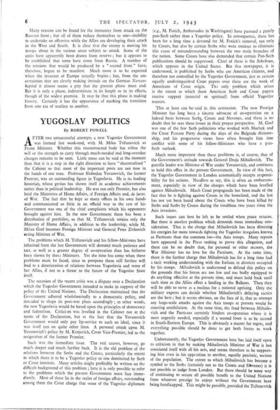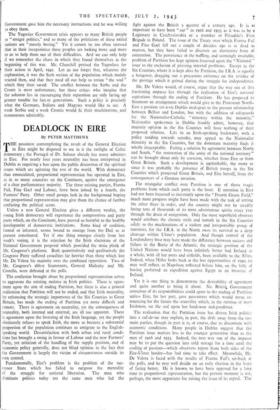YUGOSLAV POLITICS
By ROBERT POWELL
AFTER two unsuccessful attempts a new Yugoslav Government was formed last week-end, with M. Milos Trifunovich as Prime Minister. Whether this reconstructed body has either the will or the strength to carry through much-needed and long-overdue changes remains to be seen. Little more can be said at the moment than that it is a step in the right direction to have " decentralised " the Cabinet so that most of the important posts are not now in the hands of one man. Professor Slobodan Yovanovich, the former Premier, was an outstanding figure in Yugoslavia. He is its leading historian, whose genius has shown itself in academic achievements rather than in political leadership. He was not only Premier, but also held the Ministries of Home Affairs, of Foreign Affairs and, de facto, of War. The fact that he kept so many offices in his own hands and communicated so little in an official way to the rest of his Government was one of the chief complaints which his opponents brought against him. In the new Government there has been a distribution of portfolios, so that M. Trifunovich retains only the Ministry of Home Affairs, in addition to the leadership, while M. Milan Grol becomes Foreign Minister and General Peter Zivkovich acting Minister of War.
The problems which M. Trifunovich and his fellow-Ministers have inherited from the last Government will demand much patience and tact, as well as a greater degree of co-operation than has hitherto been shown by these Ministers. Yet the time has come when these problems must be faced, since to postpone them still further will lead to a deterioration of relations between Yugoslavia and some of her Allies, if not to a threat to the future of the Yugoslav State itself.
The occasion of the recent crisis was a dispute over a Declaration which the Yugoslav Government intended to make in support of the policy of the United Nations. The Declaration maintained that the Government adhered wholeheartedly to a democratic policy, and intended to shape its post-war plans accordingly ; in other words, the new Yugoslavia would be based upon the principles of democracy and federalism. Criticism was levelled in the Cabinet not at the terms of the Declaration, but at the fact that the Yovanovich Government would only pay lip-service to such an ideal, since it was itself run on quite other lines. A personal attack upon M. Yovanovich's policy by M. Krnjevich, Croat Vice-Premier, led to the resignation of the former Premier.
Such was the immediate issue. The real causes, however, go much deeper and much further back. It is the old problem of the relations between the Serbs and the Croats, particularly the extent to which there is to be a Yugoslav policy or one dominated by Serb or Croat interests. Many articles might profitably be written on the difficult background of this problem ; here it is only possible to refer to the problems which the present Government must face imme- diately. Most of these lie in the realm of foreign affairs, outstanding among them the Croat charge that some of the Yugoslav diplomats (e.g., M. Fotich, Ambassador in Washington) have pursued a purely pan-Serb rather than a Yugoslav policy. In consequence, there has been for a long time a demand for M. Fotich's removal, not only by Croats, but also by certain Serbs who were anxious to eliminate this cause of misunderstanding between the two main branches of the nation. Some Croats have also demanded that certain Pan-Serb publications should be suppressed. Chief of these is the Srbobran, which appears in the United States. But this newspaper, it is understood, is ;published by Serbs who are American citizens, and therefore not controlled by the Yugoslav Government, just as certain equally undistinguished Croat papers over there are the work of Americans of Croat origin. The only problem which arises is the extent to which these American Serb and Croat papers receive support (material or spiritual) from official Yugoslav sources.
This at least can be. said in this connexion. The new Foreign Minister has long been a sincere advocate of co-operation on a federal basis between Serbs, Croats and Slovenes, and there is no doubt that he sees these issues in their proper perspective. M. Grol was one of the few Serb politicians who worked with Machek and the Croat Peasant Party during the days of the Belgrade dictator- ship,• and his progressive views have often brought him into conflict with some of his fellow-Ministers who have a pan- Serb outlook.
Much more important than these problems is, of course, that of the Government's attitude towards General Draja Mihailovich. The guerilla leader was Minister of War under Yovanovich, and continues to hold this office in the present Government. In view of this fact, the Yugoslav Government in London automatically accepts responsi- bility for his actions. Needless to say, this is often an embarrass- ment, especially in view of the charges which have been levelled against Mihailovich. Much Croat propaganda has been made of the fact that he is fighting against Croats in the homeland, and the last has not yet been heard about the Croats who have been killed by Serbs and Serbs by Croats during the troublous two years since the Axis invasions.
Such issues can best be left to be settled when peace returns. But there is another problem which demands more immediate con- sideration. That is the charge that Mihailovich has been directing his energies far more towards fighting the Yugoslav irregulars known as Partisans than the common foe—the Axis troops. Many reports have appeared in the Press seeking to prove this allegation, and there can be no doubt that, for personal or other reasons, the War Minister has no love for the Partisans. At the same time, there is the further charge that Mihailovich has for a long time had a tacit working understanding with the Italians in districts occupied by his troops. Mihailovich is understood to defend this policy on the grounds that his forces are too few and too badly equipped to do anything effective at the present time, and must hold back until such time as the Allies effect a landing in the Balkans. Then they will be able to serve as a nucleus for a national uprising. Only the military experts can decide whether Mihailovich's delaying tactics are the best ; but it seems obviotis, on the face of it, that to attempt any large-scale attacks against the Axis troops at present would be courting annihilation. At the same time, the feud between Mihailo- vich and the Partisans certainly hinders co-operation where it is most urgently needed, especially if a second front is to be started in South-Eastern Europe. This is obviously a matter for regret, and everything possible should be done to get both forces to work together.
Unfortunately, the Yugoslav Government here has laid itself open to criticism in that by making Mihailovich Minister of War it has associated itself with all his acts, and seems therefore to be support- ing him even in his opiksition to another, equally patriotic, section of the population. The extent to which Mihailovich has become a symbol to the Serbs (certainly not to the Croats and Slovenes) it is not possible to judge from London. But there should be some way of continuing to secure all possible benefit to the United Nations from whatever prestige he enjoys without the Government here being handicapped. This might be possible, provided the Trifunovich
Government gave him the necessary instructions and he was willing to obey them.
The Yugoslav Government crisis appears to many British people as "emigre politics," and so many of the politicians of these exiled nations are "merely boring." Yet it cannot be too often stressed that in their inexperience these peoples are looking more and more to us to help them out of their difficulties. And we can only help if we remember the chaos in which they found themselves at the beginning of this war. Mr. Churchill praised the Yugoslays for their action in April, 1941. Let us not forget that, whatever the explanation, it was the Serb section of the population which mainly reacted then, and that they need all our help to retain " the soul " which they then saved. The conflict between the Serbs and the Croats is most unfortunate, but those critics who imagine that the solution lies in encouraging their separation are only laying up greater trouble for fun. re generations. Such a policy is precisely what the Germans, Italians and Magyars would like to see. A weak Serbia and a weak Croatia would fit their machinations_ and manoeuvres admirably.



























 Previous page
Previous page